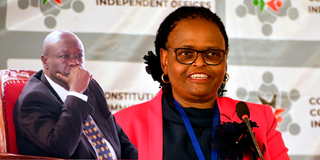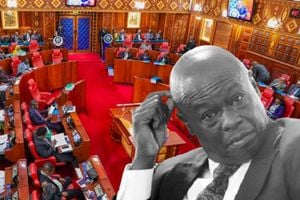
Deputy President Rigathi Gachagua and Chief Justice of Kenya, Martha Koome.
The fate of Deputy President Rigathi Gachagua now lies with the Senate, but the second in command still has a recourse in the High Court, should senators vote to uphold the resolution of the National Assembly, impeaching him.
Article 145 (5) of the Constitution states that the deputy president has the right to appear before the Senate to be heard, before the senators vote on the impeachment charges.
If at least two-thirds of all the senators vote to uphold any impeachment charge, he will cease to hold office but he has a recourse in the High Court.
Lawyers are, however, divided in opinion as to whether Mr Gachagua will get orders at the High Court, staying the impeachment, should senators vote to kick him out of office.
Lawyer Elias Mutuma said Mr Gachagua will definitely move to the High Court, as a matter of right, to seek conservatory orders, suspending the decision of the Senate.
Merits of the ouster
Mr Mutuma said the High Court will be concerned at that stage, with the process of the impeachment and not the merits of the ouster.
“The court will only be concerned with the process to see whether it was in tandem with the constitution. The court will also have to satisfy itself whether there were procedural breaches, and if convinced that there were breaches, a conservatory order will be issued stopping the President from acting on the resolution of Parliament,” he said.
The same was buttressed by an advocate who is among the battery of lawyers defending Mr Gachagua, who asked not to be named as he is not authorised to speak on behalf of the team.
The lawyer said the team is sure of obtaining a favourable court order, should the Senate go ahead and uphold the impeachment of Mr Gachagua.
According to the lawyer, the National Assembly failed the first test of public participation, which was held last week.
“The court has clearly pronounced itself on the issue of public participation. What we saw during the purported public participation exercise was a charade. We have maintained that one day for the exercise was not enough,” he said.
The lawyer said Parliament might have added an extra day, following a court order, but he questioned where the notice informing Kenyans about the extension was published.
“Was there a reasonable notice or reasonable opportunity?” he asked.
He added that Mr Gachagua was not given a fair hearing and his team was prepared to argue the case all the way to the Supreme Court.
“Courts have clearly stated that public participation must be purposive and meaningful. Not a cosmetic exercise or illusionary,” he said.
But lawyer Adrian Kamotho had a different view stating that the process so far has adhered to all the requirements of the law and the Constitution.
The lawyer said a public participation exercise is not a referendum per se but an opportunity for Kenyans to air their views.
“Not everybody was expected to participate. The failure to participate should not be an issue and the fact that someone was not heard is not enough to annul the process,” he said.
Dr Kamotho noted that courts have so far exercised restraint because in his view, the process has adhered to the requirements of the law.
“The National Assembly has been very meticulous in ensuring that the law and the constitution is adhered to and the principles of fair hearing complied with,” he said adding that Mr Gachagua was given a chance to present his side of the story before the House, when it is not expressly provided for in the constitution.
Dr Kamotho added that he doesn’t see any loophole the Deputy President can exploit to convince the court to give him a conservatory order.
“Like every Kenyan, he has a right to access the court and present his case but it would be very difficult to attack the process so far as there appears to be no breaches,” he said.
Lawyer Assa Nyakundi said anything is possible but it will depend on how Mr Gachagua’s lawyers will present his case.
The lawyer, however, said it will be an uphill task for Mr Gachagua.









